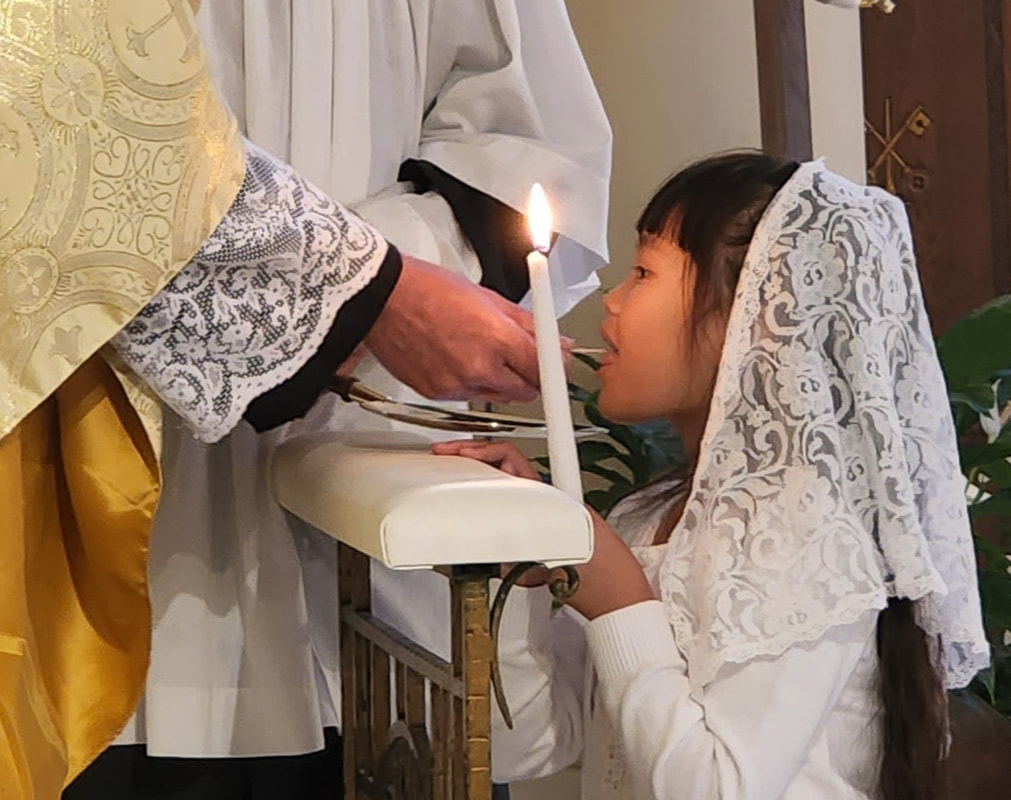On this Sunday we also celebrate Corpus Christi, the “Body of Christ,” the inestimable gift of the Holy Eucharist. This feast is properly celebrated on Thursday, because it was on Holy Thursday that Christ instituted the sacrifice at the Last Supper. “Three Thursdays shine brighter than the sun:” Holy Thursday, Ascension Thursday, and Corpus Christi Thursday. Pope Urban IV established this feast in 1264, asking St. Thomas Aquinas to compose hymns and prayers for the Mass. Thomas wrote the Sequence you just heard, the Lauda Sion, beautifully sung our cantor Natalia. Until 1955 the Church celebrated an Octave of Corpus Christi, concluding with the Feast of the Sacred Heart eight days later. St. Margaret Mary, around the year 1675, received this request from Our Lord: “I ask that the first Friday after the Octave of Corpus Christi be set apart as a special feast to honor my Heart.” We physically receive the Sacred Heart of Christ each time we receive the Corpus Christi, as forensic analysis of the Eucharistic miracle at Lanciano demonstrated: human cardiac tissue of blood type AB.
The Gospels of Matthew, Mark, and Luke contain the Last Supper, whereas John’s Gospel has no Last Supper but provides the doctrine of the Eucharist in the Sixth Chapter: “Unless you eat the flesh of the Son of Man and drink his blood, you have no life within you, for my flesh is true food and my blood true drink.” This sounds bizarre to those who do not understand sacramental theology. The first century Roman government proscribed the Mass as cannibalism, and today the vast majority of people, and even most Catholics, do not believe that the Eucharist is the body, blood, soul, and divinity of Christ. It is on Corpus Christi that priests must teach and explain this most core doctrine of the Catholic faith.
St. Paul, in our second reading, explains it himself. “Brethren, I received from the Lord what I also handed on to you: that the Lord Jesus, on the night he was handed over, took bread, and after he had given thanks, broke it and said, ‘this is my body, given up for you.’… As often as you eat this bread and drink this chalice, you proclaim the death of the Lord until he comes.” Most Catholics think of the Mass as a meal, and indeed it is a sacred banquet. But Paul does not use the word "meal;" rather he defines the Eucharist as "the death of the Lord," a sacrificial banquet in which the host serves his own flesh (indeed, the English word "host" comes from the Latin hostia, meaning "sacrifice." But the manner in which the Mass has usually been celebrated for the last 50 years does not portray a sacrificial death. Most Masses look like polite social gatherings or even birthday parties with clowns and balloons. And that is largely why most Catholics no longer believe in the Eucharist. If priests and musicians celebrate Mass as a "party," people will understand it as a “party.” If priests celebrate the Mass as a sacrifice, "proclaiming the death of the Lord until He comes," people will understand it as a sacrifice.
St. Paul goes on to say in the verse after today’s second reading: “therefore, whoever eats the bread or drinks the chalice of the Lord unworthily must answer for the blood of the Lord.” These words were deleted from the Corpus Christi Mass in 1970, and as a result most Catholics have no concept of an “unworthy” reception of the Eucharist. Paul defines “unworthy” reception as eating the Body of Christ without “discerning” the Body—not believing in the Real Presence, or not believing in the Presence of Christ in the bodies of others. For this reason, canon law requires pastors to deny holy communion to those who “obstinately persist in manifest grave sin,” and requires all of us to “examine” ourselves. If we are in mortal sin, we must seek sacramental absolution before approaching the Body of Christ. This is not easy, either for pastors or for any Catholic. It’s not easy to be Catholic.
Receiving the Body of Christ while denying the Body of Christ (either in the Sacrament or in the People of God) is drinking death unto ourselves, as St. Thomas expresses it in verses 16 and 17 of the Lauda Sion: Sumunt boni, sumunt mali; mors est malis, vita bonis. “The good receive it, the bad receive it; it is death to the bad, but life to the good.” Things have not changed since 1264! Most Catholics still receive the Eucharist, the “good” and the “bad,” but to those “not discerning the body,” the Eucharist is death. Truly, those Catholics who have given up their faith but still receive Holy Communion so as to “look good” have become the most powerful promoters of death in politics, the entertainment industry, and the education system. The corruption of the best is the worst.
Not one of us is “worthy” to receive the Body of Christ. We are only made worthy by surrendering ourselves to Christ, whose body we receive. And so the most appropriate prayer before receiving the Body of Christ is that of the pagan centurion: “Lord, I am not worthy to receive you, but only say the word and my soul will be healed.”



 RSS Feed
RSS Feed